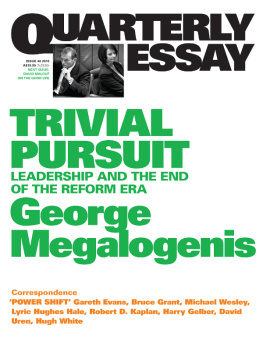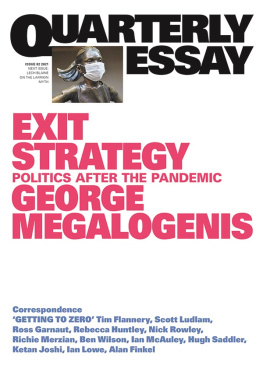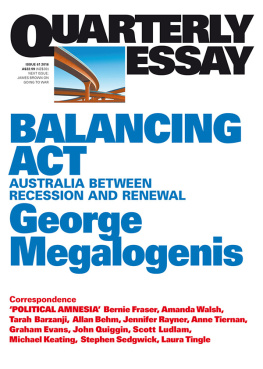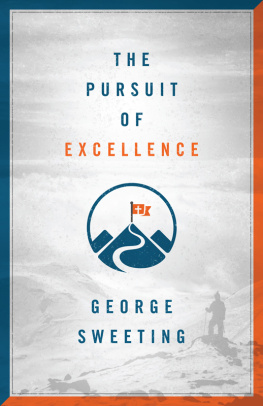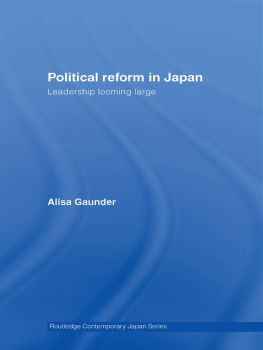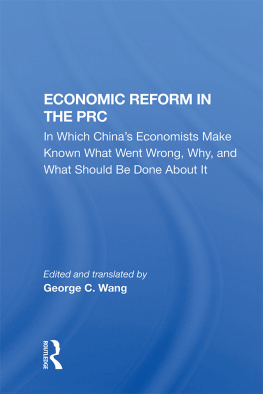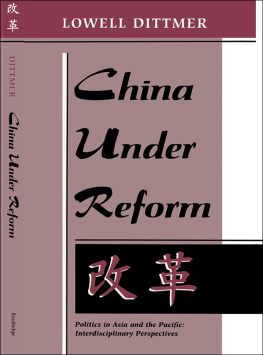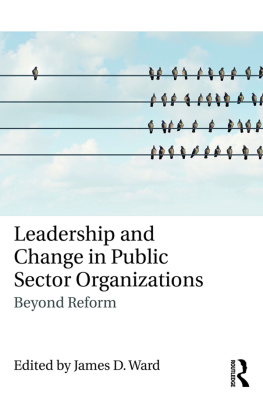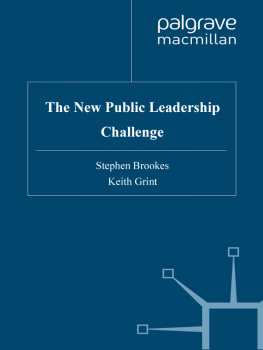Quarterly Essay is published four times a year by Black Inc., an imprint of Schwartz Media Pty Ltd. Publisher: Morry Schwartz.
e-ISBN 978-1-921866-53-1
ALL RIGHTS RESERVED.
No part of this publication may be reproduced, stored in a retrieval system, or transmitted in any form by any means electronic, mechanical, photocopying, recording or otherwise without the prior consent of the publishers.
Essay & correspondence retained by the authors.
Print subscriptions 1 year (4 issues): $49
within Australia incl. GST. Outside Australia $79.
2 years (8 issues): $95 within Australia incl. GST.
Outside Australia $155.
Payment may be made by Mastercard or Visa, or by cheque made out to Schwartz Media. Payment includes postage and handling.
To subscribe, fill out and post the subscription card or form inside this issue, or subscribe online:
www.quarterlyessay.com
subscribe@blackincbooks.com
Phone: 61 3 9486 0288
Correspondence should be addressed to:
The Editor, Quarterly Essay
3739 Langridge Street
Collingwood VIC 3066 Australia
Phone: 61 3 9486 0288 / Fax: 61 3 9486 0244
Email: quarterlyessay@blackincbooks.com
Editor: Chris Feik. Management: Sophy Williams, Caitlin Yates. Publicity: Elisabeth Young. Design: Guy Mirabella. Assistant Editor/Production Coordinator: Adam Shaw.
TRIVIAL
PURSUIT
Leadership and the End of the
Reform Era
George Megalogenis
Elections are a form of peer-group pressure, in which leaders are bullied into being as small-minded as the public at its worst. Yet voters are not so stupid that they cant see their knees being jerked. In 2010 Julia Gillard and Tony Abbott broke the democratic contract with a campaign so awful that it begged a collective rebuke.
I hadnt seen anything like it in more than twenty years of covering national affairs. It was a flip of a coin who was the more annoying: the robotic prime minister or the relentlessly negative Opposition leader. I wanted to pen a resignation letter to my employer: Dear Rupert, sorry, I cant pretend that this contest is worth reporting. Neither candidate deserves to win. Julia wont talk the country up; Tony keeps talking it down.
Two amiable and intelligent politicians had frozen, together. They delivered no memorable quotes, let alone policies merely slogans that quickly became punchlines at their own expense: moving forward and the real Julia versus stop the boats and end the waste.
The quick, and romantic, conclusion to draw is that the people willingly smashed the machine by choosing none of the above on 21 August. To borrow one of Kevin Rudds better mantras, Australia declared that this reckless style of campaigning must stop. That may be true, but I wouldnt take the next step and assume that a hung parliament is the solution to a crisis of governance that has been a decade in the making.
Today there is a whiff of the conflict-ridden 1970s in the air. The main parties have nothing to offer their supporters beyond conspiracy theories about their opponents. Labor blames the media and a bloody-minded Opposition for the shrill tone to the national conversation. The Coalition points the bone back at Labor, which it accuses of being the worst government in history.
Business and organised labour have assumed the right of veto over policies they dont like, and they spend millions in advertising to make their point. News organisations engage in turf wars, most notably the ABC and the Australian. The media reflect and reinforce the malaise through the restless search for another scandal to fill the 24-hour news cycle.
The election year felt like one long domestic dispute. The row didnt end with Rudds dumping as prime minister; it just took another screwy form as Gillard and Abbott competed for the right to shrink the nation. In no previous post-war campaign had both sides agreed to reduce the immigration intake regardless of the economic cycle. Ben Chifley and Robert Menzies would turn in their graves if they knew their political grandchildren could be so easily intimidated by public opinion.
The extraordinary thing is that Australia has never looked more appealing to the rest of the world. Whenever a government minister attends an international forum, the first question they are asked is, How did you guys do it? By this the questioner means: how did we avoid the global recession?
The 2010 campaign was the sound of a nation needlessly fracturing. Each side of politics clung like a barnacle to its version of reality. It is rare for the main parties to talk themselves into opposite corners of a room. One or the other has usually had a strong enough sense of where the majority sits to lay claim to it. But Gillard and Abbott, and behind them their poll-obsessed teams, were so terrified of offending the disengaged that they forgot to inspire the voters who were paying attention.
The Australia that revealed itself at the ballot box on 21 August was split every which way. Between the mining states and the southern states. Between men and women. And between old and young. The criss-cross of moods sent two unmistakable messages. To the Liberal Party and its coalition partner, the Nationals Australia still leans centre-left, even in the bush. To the Labor Party you blew it.
LOSING IT
Australians elect Labor governments to change things. They never give them large majorities, but they reward them with successive terms if they can look after the heart as well as the hip pocket.
The contract between voters and Coalition governments is less demanding. Conservatives invariably take office in a landslide and hold power for long stretches, provided that they dont inflict a recession on middle-income earners or unsettle them with a broken election promise such as WorkChoices.
These differing expectations make for a double standard that Labor people revel in because it fits with the heroic notion that theirs is the party of progress. But it also means Labor cannot afford to run a do-nothing government because Australians will mark it more harshly than the Coalition when it fails to deliver reform.
The issue that triggered Labors loss of face in 2010 was climate change. Kevin Rudd had presented it as our greatest moral and economic challenge. So when he shelved his emissions trading scheme (ETS) in April, without so much as a sit-down press conference to explain why, his personal approval rating collapsed. He followed the backdown on climate change with a fight over the taxation of mining. Rudd wanted to prove he still had vision and strength, but he picked an issue that was too complex to be digested in the time he had left before the election was due to be called. The so-called resource super profits tax clarified why our system had lost its ability to solve problems. The government dropped the tax on the community with no warning in the week before the May budget. The Opposition didnt pause to digest the merits of the tax because it saw a political opportunity in obstruction. The miners went to war with an advertising campaign that tested the limits of our democracy. The media, transfixed by the prospect that Rudd might lose his job, surrounded the combatants like the crowd at a schoolyard brawl, willing each side to keep punching.


